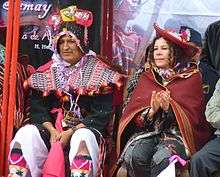Pukllay

Bolivian President Evo Morales and Culture Minister Elizabeth Salguero attend the Pujllay festival which their administration has nominated for UNESCO recognition
Pujllay or phujllay (Quechua for to play, play / carnival,[1] other spellings pugllay, phujllay, pujhllay, pujllay) is a traditional festival held in the central Andes. The word "play" refers to either the clouds or the blossoms "playing" in the winds at the end of the rainy season and thus harvesting time. The Bolivian pujllay is connected to the Christian carnival and the celebration of a battle won over the Spaniards – hence the appropriation of the Spanish helmets and spurs one can still see in the ritual dance.
In March 2011, Bolivia nominated the Pujllay festival in Tarabuco (including the Ayarichi dance of the Yampara people) to UNESCO for World Heritage recognition as part of the cultural and intangible heritage of humanity.[2]
See also
References
- ↑ Teofilo Laime Ajacopa, Diccionario Bilingüe Iskay simipi yuyayk'ancha, La Paz, 2007 (Quechua-Spanish dictionary)
- ↑ "Bolivia postula tres expresiones culturales como patrimonio inmaterial ante la Unesco". Los Tiempos. 2011-03-17. Archived from the original on 2014-02-01. Retrieved 2011-04-07.
This article is issued from Wikipedia - version of the 9/7/2016. The text is available under the Creative Commons Attribution/Share Alike but additional terms may apply for the media files.